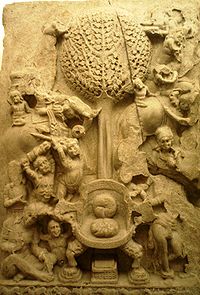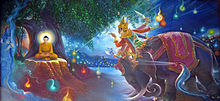- Mara (demon)
-
For other uses, see Mara (disambiguation).
In Buddhism, Māra (Burmese: မာရ်နတ်) is the demon that tempted Gautama Buddha by trying to seduce him with the vision of beautiful women who, in various legends, are often said to be Mara's daughters.[1] In Buddhist cosmology, Mara personifies unwholesome impulses, unskillfulness, the "death" of the spiritual life. He is a tempter, distracting humans from practicing the spiritual life by making the mundane alluring or the negative seem positive.
The early Buddhists, however, rather than seeing Mara as a demonic, virtually all-powerful Lord of Evil, regarded him as more of a nuisance. Many episodes concerning his interactions with the Buddha have a decidedly humorous air to them.
In traditional Buddhism four senses of the word "mara" are given.
- Klesa-mara, or Mara as the embodiment of all unskillful emotions.
- Mrtyu-mara, or Mara as death, in the sense of the ceaseless round of birth and death.
- Skandha-mara, or Mara as metaphor for the entirety of conditioned existence.
- Devaputra-mara, or Mara the son of a deva (god), that is, Mara as an objectively existent being rather than as a metaphor.
Early Buddhism acknowledged both a literal and "psychological" interpretation of Mara. Mara is described both as an entity having a literal existence, just as the various deities of the Vedic pantheon are shown existing around the Buddha, and also is described as a primarily psychological force - a metaphor for various processes of doubt and temptation that obstruct spiritual practice.
"Buddha defying Mara" is a common pose of Buddha sculptures. The Buddha is shown with his left hand in his lap, palm facing upwards and his right hand on his right knee. The fingers of his right hand touch the earth, to call the earth as his witness for defying Mara and achieving enlightenment. This posture is also referred to as the 'earth-touching' mudra.
Contents
Etymology
The word "Mara" comes from the Proto-Indo-European root *mer meaning to die, and so it is related to the European Mara, the Slavic Marzanna and the Latvian Māra.Mara in Latvian mythology means - The Mother of Earth and has positive meaning. She is wise and generous. [2]
Notes
- ^ See, for instance, SN 4.25, entitled, "Māra's Daughters" (Bodhi, 2000, pp. 217-20), as well as Sn 835 (Saddhatissa, 1998, page 98). In each of these texts, Mara's daughters (Māradhītā) are personified by sensual Craving (taṇhā), Aversion (arati) and Passion (rāga).
- ^ Turner, Sir Ralph Lilley; Dorothy Rivers Turner (January 2006) [1962]. A comparative dictionary of the Indo-Aryan languages. (Accompanied by three supplementary volumes: indexes, compiled by Dorothy Rivers Turner: 1969. – Phonetic analysis: 1971. – Addenda et corrigenda: 1985. ed.). London: Oxford University Press,. p. 567 quote=mará 9867 mará m. ' *death ' (' world of death ' AitUp.), maraka- m. ' epidemic '. [√mr̥] Pk. mara — m. ' death ', Ash. mə́rə, Wg. mara (as ' god of death ' < māra — ), Kt. médotdot;rë; Kho. (Lor.) mor ' a disease of small cattle '; K. mara — mar f. ' great mortality '; S. marī f. ' epidemic, cholera '; P. WPah.jaun. marī f. ' plague '; N. maro ' death '; A. mor ' diarrhoea '; B. marā ' death '; Mth. marī ' disease in which the whole plant is burnt up '; H. marī, marrī (< *marṛī?) f. ' plague, pestilence '; G. marɔ m. ' death '; M. mar f. n. ' blasted crop, dead portion (of crop, wood, &c.) ', f. ' dying or sickly state ', marī f. ' epidemic ', marā — mar f. great mortality '; Si. mara ' death '; — ext. — kk — : N. marki ' plague ', H. marak m., G. markī f. (cf. parallel formation from MIA. maḍa — < mr̥tá — : P. maṛak m. ' plague ', Or. maṛaka, H. maṛak m.).. http://dsal.uchicago.edu/cgi-bin/philologic/contextualize.pl?p.4.soas.198140. Retrieved 20 Apr 2011.
Sources
- Bodhi, Bhikkhu (trans.) (2000). The Connected Discourses of the Buddha: A Translation of the Samyutta Nikaya. Boston: Wisdom Pubs. ISBN 0-86171-331-1.
- Saddhatissa, H. (translator) (1998). The Sutta-Nipāta. London: RoutledgeCurzon Press. ISBN 0-7007-0181-8.
See also
- Yama - The king of the dead in Buddhist mythology.
External links
- The Buddha's Encounters with Mara the Tempter: Their Representation in Literature and Art
- Taming the Mara
- Buddhism. History of the Devil, by Paul Carus, [1900], at sacred-texts.com
Buddhism Categories:- Buddhist deities, bodhisattvas, and demons
Wikimedia Foundation. 2010.


